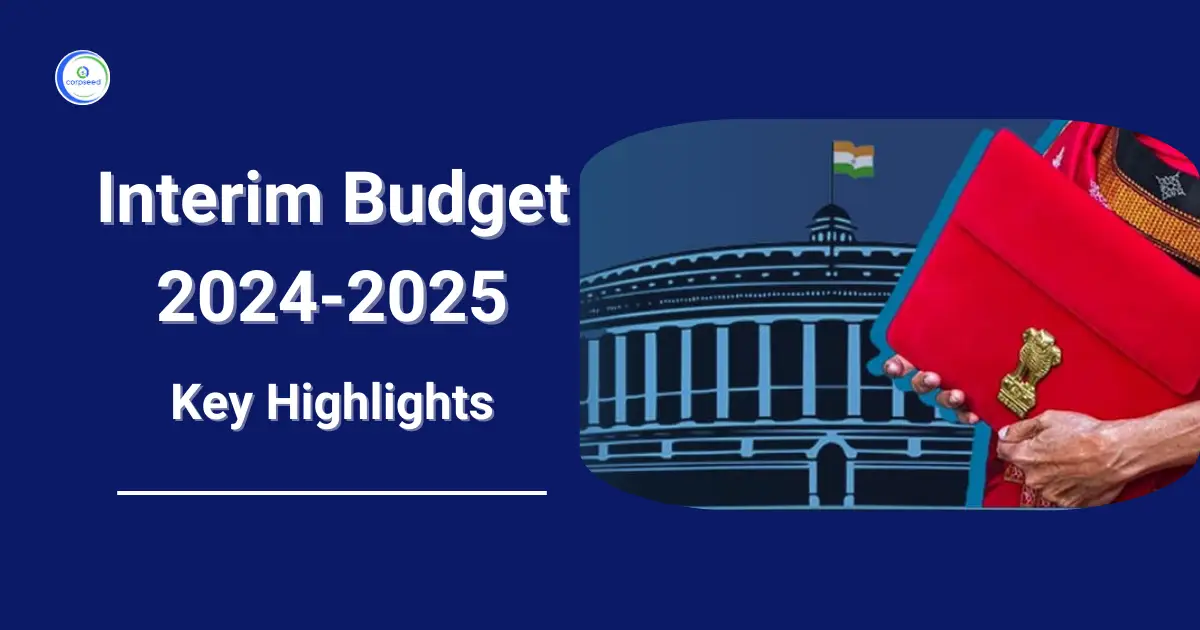Interim Budget: Definition
A short-term financial plan, often known as an interim budget, is presented prior to the general elections that will usher in a new administration. It can be seen as a stopgap measure to list government spending until a new administration takes power and drafts a new budget.
Table of Contents
- Interim Budget: Definition
- Interim Budget 2024-2025: Key Highlights
- Viksit Bharat Scheme
- Youth, Agriculture, and Food Processing Sectors
- Women Welfare
- Environment and Sustainable Development
- Investments and Infrastructure
- Health Industry
- Housing and Tourism
- Agriculture and Food Processing Sector
- Tax Reforms & Proposals
- Allotment in Major Schemes
- Sector Wise Allocation of Funds
- Sectors that have benefitted from the Interim Budget 2023-2024
- Sectors Affected by the Interim Budget 2023-2024
- Conclusion
Interim Budget 2024-2025: Key Highlights
Ahead of the Lok Sabha elections, on February 1, Union Finance Minister Nirmala Sitharaman presented the interim budget to the House. According to the declarations, the tax slabs for both the previous and current administrations stayed the same. Furthermore, the industry has been taken aback by the FY 2024–2025's zero modifications to direct and indirect taxes, including import duties, even though this is mostly consistent with prior interim budgets. In Budget 2023, the federal government unveiled several new income tax initiatives. One important announcement regarding personal taxes was the default to the new income tax structure.
Viksit Bharat Scheme
An ambitious vision of a "Prosperous Bharat in harmony with nature, modern infrastructure, and opportunities for all" is presented in the interim budget for 2024, which outlines plans to achieve Viksit Bharat by 2047.
Additionally, it discusses People-Centric Inclusive Development (PCID), which involves the substantive development of all infrastructure types as well as the promotion of formalization and financial inclusion through Digital Public Infrastructure (DPI). expansion and deepening of the tax base through the GST and GIFT IFSC, a strong entry point for international finance and financial services for the economy.
Youth, Agriculture, and Food Processing Sectors
The budget supports young entrepreneurial aspirations by approving 43 crores in loans under the PM Mudra Yojana and offers credit assistance to 78 lakh street vendors under PM-SVANidhi.
The budget included measures to enhance farmer welfare, including integration of 1,361 mandis under eNAM, which supports ₹ 3 lakh crore in trading volume, and direct financial assistance to 11.8 crore farmers under PM-KISAN and crop insurance to 4 crore farmers under PM Fasal Bima Yojana.
Women Welfare
The budget prioritized women's security and well-being, with a focus on 30 crore Mudra Yojana loans to female entrepreneurs, a 28 percent increase in female enrollment in higher education over ten years, 43 percent of female enrollment in STEM courses, and 1 crore women helped by 83 lakh SHGs to become Lakhpati Didis.
Environment and Sustainable Development
The promise to achieve "Net Zero" by 2070, rooftop solarization, and the introduction of a new program for biomanufacturing and bio-foundry to be established to assist environmentally friendly alternatives made this interim budget a green paradise.
Investments and Infrastructure
Regarding investments and infrastructure, the budget noted the following: the execution of three significant railway corridor projects under PM Gati Shakti to enhance logistical effectiveness and lower costs; the encouragement of foreign investment through bilateral investment treaties; Enhancement of the Physical Framework UDAN program's expansion of current airports and thorough construction of new airports Urban change is being promoted through Metro rail and NaMo Bharat.
Health Industry
The budget for the health sector came in with a welcome wave of encouragement for girls (9–14 years old) to get the cervical cancer vaccine, for Saksham Anganwadi and Poshan 2.0 to be expedited for better nutrition delivery, early childhood care, and the development of U-WIN platform for Mission Indradhanush immunization efforts to be rolled out, and for all ASHA, Anganwadi workers, and helpers to get health coverage under the Ayushman Bharat scheme.
Housing and Tourism
The budget included a housing initiative to encourage middle-class people to buy or build their own homes, as well as the Pradhan Mantri Awas Yojana (Grameen), which is almost halfway towards its goal of 3 crore residences. An additional 2 crore houses are targeted for the next five years.
The government is promoting Indian tourism by implementing projects for port connectivity, infrastructure, and amenities that will be implemented in islands, such as Lakshadweep.
Agriculture and Food Processing Sector
In the meantime, the agriculture and food processing sectors are given the means to encourage both public and private investment in post-harvest activities, expand the use of Nano-DAP in all agroclimatic zones, and develop the Atmanirbhar Oilseeds Abhiyaan-Strategy to attain oilseed dependency. To improve aquaculture productivity, a thorough plan for dairy development will be developed, and the Pradhan Mantri Matsaya Sampada Yojana will be implemented more aggressively.
The Indian economy has prospered due to a sharp decline in the unemployment rate, headline inflation, average monthly gross GST collections, and an increase in the amount of digital transactions.
Tax Reforms & Proposals
The budget's proposed tax reforms include the following:
- A reduction in the average processing time of returns from 93 days in 2013–14 to 10 days in 2023–24;
- A decrease in the cost of most goods and services and logistics;
- An increase in state revenue from 0.72 in 2012–16 to 1.22 in the post–GST period (2017–23);
- A decrease in the time it takes to release imports since 2019;
- Specific tax advantages for new businesses and investments made by pension and sovereign wealth funds;
- The extension of the tax exemption of some IFSC units that was originally scheduled to expire on 31.03.2024 to 31.03.2025;
- Withdrawal of unpaid direct tax demands up to ₹25,000 for fiscal years 2010 through FY15; up to ₹10,000 for fiscal years 2011 through FY15;
- Additionally, under the new tax system, taxpayers with incomes up to ₹7 lakhs are exempt from paying taxes.
Allotment in Major Schemes
Major initiatives like the Modified Programme for Development of Semiconductors and Display Manufacturing Ecosystem, Ayushman Bharat-PMJAY, Mahatma Gandhi National Rural Employment Guarantee Scheme, Production Linked Incentive Scheme, Solar Power (Grid), and National Green Hydrogen Mission for 2024–2025 have received funding.
Sector Wise Allocation of Funds
| Ministry of Defence | Rs. 6.2 Lakh Crores |
| Ministry of Road Transport and Highways | Rs. 2.78 Lakh Crores |
| Ministry of Railways | Rs. 2.55 Lakh Crores |
| Ministry of Consumer Affairs, Food & Public Distribution | Rs. 2.13 Lakh Crores |
| Ministry of Home Affairs | Rs. 2.03 Lakh Crores |
| Ministry of Rural Development | Rs. 1.7 Lakh Crores |
| Ministry of Chemicals and Fertilizers | Rs. 1.68 Lakh Crores |
| Ministry of Communications | Rs. 1.37 Lakh Crores |
| Ministry of Agriculture and Farmer's Welfare | Rs. 1.27 Lakh Crores |
Sectors that have benefitted from the Interim Budget 2023-2024
- Infrastructure
The development of a country's infrastructure has a direct impact on its economy. The Indian government has prioritized infrastructure development over the years and has made several significant announcements for the industry. Not only will infrastructure development strengthen the economy of the nation, but it will also provide employment. It will also increase both supply and demand for goods.
- Agriculture
India's economy is based primarily on agriculture, as is widely recognized. Farmers and other industry participants have criticized the government over the years for a number of its efforts. By making announcements that will help both them and the industry as a whole, it hopes to calm them down.
- Renewable Energy
Global economies have been debating climate change extensively. India hopes to reach a net zero emission target by 2070, therefore major announcements in the renewable energy industry have been made in the interim budget of 2024. Announcements for the industry should assist India in reducing its reliance on fossil fuels as well as its carbon emissions. Consequently, this will assist the government in resolving budgetary deficit issues and bringing it within acceptable bounds.
- Tourism
States will be urged to build famous tourism destinations to draw tourists and foster local commercial prospects. States will be given long-term, interest-free loans to promote the growth of housing tourism. An international audience was exposed to the variety of India through the increased funding for PMAY G20 summits in 60 locations, and initiatives for port connection, tourist infrastructure, and amenities will be implemented in islands, including Lakshadweep.
Sectors Affected by the Interim Budget 2023-2024
- Entrepreneurship and Startup Ecosystem
The Interim Budget's announcement to extend the tax vacation to incorporated startups until March 31, 2025, was arguably the only one that directly related to the startup sector. This was extended from March 2023 to March 2024 last year.
Startups that meet the eligibility requirements (as outlined by the DPIIT) are eligible for a tax vacation that lasts for three of the seven years following the date of incorporation, as long as their annual turnover stays under INR 25 Cr throughout each of those seven years.
Conclusion
In summary, the seven goals of the interim budget for 2024–2025 are the financial sector, infrastructure & investment, youthful power, health & women, inclusive development, unleashing potential, and sustainable growth.
This portion of the site is for informational purposes only. The content is not legal advice. The statements and opinions are the expression of author, not corpseed, and have not been evaluated by corpseed for accuracy, completeness, or changes in the law.

